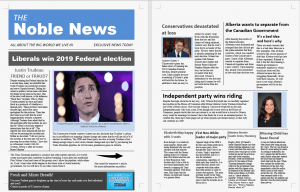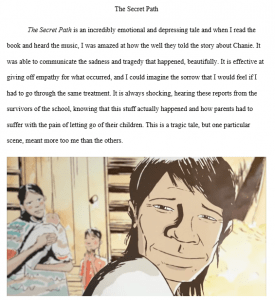Category Archives: Grade 9
Using the Creative Fluency
The project I chose was from Humanities 9 and it was after we had talked about the presidential election and politics. For this assignment, we were required to construct a newspaper talking about the outcome of the election and how people around the country felt.
Identify
We did not get a lot of criteria for the assignment itself, as we were asked to just construct our newspaper like a real one and write down the main article that talked about the election. However, in addition to making the articles, we were also required to write a paragraph that explained how we made our newspaper “look like a newspaper” and “sound like a newspaper” and what strategies we used.
Inspire
Before we started the project, we were given a bunch of newspapers as examples of what ours should look like. We wrote down various things that they each had in common and based our product on that. We were also given multiple templates to choose from to help us start, and were allowed to edit them or not use them at all.
It also helped to read the articles that were in the newspapers given to us, as it allowed me to get a grasp of the language that was used in a newspaper. There were great examples of what I could do for an ad in the papers, and some ideas for a couple of stories I could possibly write.
Newspaper Template 1 Newspaper Template 2 Newspaper Template 3
Interpolate
After we saw the examples, I had a list of things that each of them had in common, and I based my final product around that. I made sure to include an advertisement in there as it was extremely common to have at least one on every page and I also noted that the titles for the articles were all rather short and to the point, instead of being wordy and extensive. I added pictures on the pages and for the main article, wrote a caption underneath it.
Imagine
As I started to create my newspaper, I kept looking back at examples of articles so I knew how I should word the paragraphs and what it should look like. Slowly, I was starting to understand how to write the articles and soon I was able to write them without a problem. The main thing was deciding what to write about after the main article, and what the other ones would be on. As I worked on it, it began to come together, becoming more and more like what I had was envisioned.
Inspect
When I finished my assignment, I doublechecked if I had fulfilled the criteria and also wrote the paragraph that was also required with the newspaper. I went over the articles multiple times, reading them over to see if they had the same type of tone as actual newspapers. I was pleasantly surprised with how it turned out, and a couple of friends had even read my articles and said that it actually sounded like a real newspaper.
I probably could’ve been more creative with the design of the newspaper, as it is still rather plain. The name is also something I’m not too content with, but I wasn’t able to think of anything else at the time.
Protected: Reflection 2
Digital Footprint
Reflection 1
This is a part of an essay that I wrote in my Language Arts class. It’s about a book called The Secret Path, which is about the residential schools that occurred earlier in Canadian history. Children were taken away from their families at a young age, and if the parents refused, they could face time in jail. These schools were designed to make the Indigenous peoples “white” by forcing out their culture and forbidding them from speaking their language. The kids were subject to multiple types of abuse and harm, given out by the nuns and priests that resided with them.
Upon learning about these tragedies, Gord Downie, lead singer of the Tragically Hip, was shocked, and he soon discovered a story that inspired him to create The Secret Path. The story was about named Chanie Wenjack, who was a 12-year-old boy that attempted to get back to his home by following a railroad. His home was over 600 km away, and the only equipment that he had was a jar of seven matches. Chanie would eventually pass away due to starvation and environmental causes.
Downie wrote poems about Chanie’s story, and he would create songs about the story from those poems. He later put them in a book that comic artist Jeff Lemire would illustrate. The music and illustrations inspired The Secret Path, an animated film that CBC broadcasted on an hour-long commercial-free television special.
For the assignment, we needed to choose a part of either the book or film and interpret what it means in the form of an essay. The part I chose was when Chanie remembers a happier time with his family, and it shows him returning from a fishing trip and his father smiling warmly at him (above). There, the lyrics “That is not my dad; my dad is not a wild man, doesn’t even drink, my daddy’s not a wild man.” are sung. I interpreted this part as Chanie telling the reader/viewer that First Nations aren’t different from us and that they are people too. He’s asking why they are treated worse than others. The line “My dad is not a wild man” is a reference to what English Settlers would call the Indigenous people, and the “Doesn’t even drink” is Chanie explaining that his dad is a good person and that he is not a “wild man.”
This essay took me an extensive amount of time to do. Numerous amount of times I had to edit it because the words didn’t portray what I wanted. I put a lot of thought into my interpretation, and I think that it turned out decent. This became one of my favourite pieces that I wrote, with the effort I put into this making it a memorable time writing it. I also ended up getting a great mark on it and received some encouraging feedback as well. The feedback consisted of lots of compliments, but nothing that I should improve, which pleasantly surprised me. While I thought that I did a pretty good job on it, I felt that it could’ve had more detail in some parts, mainly with the reasoning of why I thought that the lyrics could be interpreted that way. Either way, I am extremely pleased with the result of both the essay and my mark. I want to be consistent with my writing so I am further able to write things that I am proud of and can look back on when I am older.

